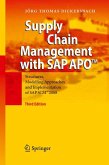Dieser Download kann aus rechtlichen Gründen nur mit Rechnungsadresse in A, B, BG, CY, CZ, D, DK, EW, E, FIN, F, GR, HR, H, IRL, I, LT, L, LR, M, NL, PL, P, R, S, SLO, SK ausgeliefert werden.
"What distinguishes the present book by Blazewicz et al. from a number of other new and interesting books on scheduling is its emphasis on the relevance of academic research to practical applications, which is precisely manifested in its title. ... Overall, the reviewed book ... is a very significant contribution to literature on scheduling and a must for anyone who is involved in the field as a student, researcher or practitioner. I heartily recommend it for study." (Eugene Levner, Journal of Scheduling, Vol. 12, 2009)









